| Srl | Item |
| 1 |
ID:
161022


|
|
|
|
|
| Summary/Abstract |
Sixty years ago, on March 5, 1946, Winston Churchill, at that time the former U.K. prime minister, gave his famous Fulton speech that is generally seen as the formal declaration of the Cold War. Churchill described the ideological division of Europe as an “Iron Curtain,” urging consolidation in the face of the Communist threat.
|
|
|
|
|
|
|
|
|
|
|
|
|
|
|
|
| 2 |
ID:
161019


|
|
|
|
|
| Summary/Abstract |
ega-scenarios for world development in the 21st century are not terribly diverse. The first among them, held to be the mainstream in present-day political thought, is reduced to forecasting American domination for the foreseeable future. U.S. preponderance over all other powers, certainly as concerns the main components of might, is unprecedented.
|
|
|
|
|
|
|
|
|
|
|
|
|
|
|
|
| 3 |
ID:
161032


|
|
|
|
|
| Summary/Abstract |
There is a widespread belief both in Russia and abroad that the Ukrainian crisis has undermined the system of international relations, which was built after the end of the Cold War at the turn of the 1990s and even since much earlier—after the end of World War II in 1945. This belief is corroborated with impressive analogies.The bone of contention then was the division of postwar Europe between the Soviet Union and the U.S. Now it is the struggle for influence in the post-Soviet area and in its second largest country after Russia—Ukraine. In former days, the geopolitical conflict took place amid the irreconcilable ideological confrontation between communism and capitalism.
|
|
|
|
|
|
|
|
|
|
|
|
|
|
|
|
| 4 |
ID:
161033
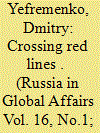

|
|
|
|
|
| Summary/Abstract |
Minor causes may have major consequences. A hundred years ago a terrorist act masterminded by a small group of Serbian nationalists set in motion a chain reaction that eventually led to a world war and the collapse of several empires. In our days, a short Facebook message calling on likeminded people to gather in Kiev’s central square led to a crisis that shook Europe and dramatically expedited changes in the existing world order. The Ukrainian crisis is at its apex and is likely to cause much more trouble
|
|
|
|
|
|
|
|
|
|
|
|
|
|
|
|
| 5 |
ID:
161038


|
|
|
|
|
| Summary/Abstract |
The spring of 2017 was marked by rather abrupt U.S. interventions in the two most sensitive areas of world politics—Syria and North Korea. The new administration ordered an attack of 59 cruise missiles on Syria in a show of force and has made unequivocal threats against North Korea. In both cases, Russia and China, the top nuclear powers alongside the United States, saw their vital interests affected. Both showed restraint, which inspires hope. But who knows what consequences such actions may have in the future. The world is entering an even more complex and explosive period. It is heavily armed with the most lethal weapons but has lost the moral and intellectual basis for effective deterrence and balance. It is this fact rather than the abundance of weapons as such that causes the greatest alarm.
|
|
|
|
|
|
|
|
|
|
|
|
|
|
|
|
| 6 |
ID:
161028
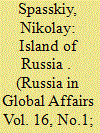

|
|
|
|
|
| Summary/Abstract |
iscussions in Russia about the modernization program and the rhetoric that surrounds every Russian-U.S. summit produce a strange impression: as if Russia keeps something back. Why does Russia want to modernize itself ? What goals does it pursue in the global arena? And more broadly, how does it perceive itself in the world? What is the purpose of its program for reequipping the Army and the Navy
|
|
|
|
|
|
|
|
|
|
|
|
|
|
|
|
| 7 |
ID:
161034
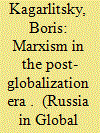

|
|
|
|
|
| Summary/Abstract |
It would be strange, to say the least, to speak about Marxism as a progressive or even influential theoretical school in Eastern Europe after the collapse of the Soviet bloc in 1989-1991. Marxist ideas have come to be associated with the repressive practices of the totalitarian Stalinist era, the failed Soviet economy and the conservative, nostalgic views of the older generation and a small segment of the youth that failed to integrate into the market economy.
|
|
|
|
|
|
|
|
|
|
|
|
|
|
|
|
| 8 |
ID:
161023
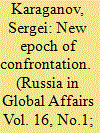

|
|
|
|
|
| Summary/Abstract |
Global politics, of which relations between the traditional West and Russia make up an essential part, is acquiring a new quality. Many analysts have been impatient to call the changes a “new Cold War.” However, the causes and forms of the confrontation, occurring right before our eyes, markedly differ from the sources of the confrontation that ended almost 20 years ago. The new confrontation is proceeding in different conditions and, most likely, it will be less profound—although it may be even more dangerous—than the confrontation of the past
|
|
|
|
|
|
|
|
|
|
|
|
|
|
|
|
| 9 |
ID:
161037
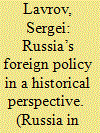

|
|
|
|
|
| Summary/Abstract |
As international relations go through a period of turbulence, Russia, as many times before, has found itself at a crossroads of key trends that will determine the direction of global development in the future.
|
|
|
|
|
|
|
|
|
|
|
|
|
|
|
|
| 10 |
ID:
161027
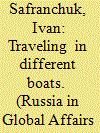

|
|
|
|
|
| Summary/Abstract |
Russian-U.S. relations have gone through several phases in the past two decades. In the early 1990s, Moscow trusted Washington and sought to establish the friendliest possible relations with the U.S. However, influential Russian political circles and society at large soon came to think that the United States was betraying the new Russia’s confidence. In the second half of the 1990s, differences between the two countries increased, culminating in the spring of 1999 when NATO launched a military operation against Yugoslavia. Just one month after that war, Russian President Boris Yeltsin, in view of the new geopolitical situation, signed a decree to introduce amendments to strategic documents—the National Security Concept and the Military Doctrine
|
|
|
|
|
|
|
|
|
|
|
|
|
|
|
|
| 11 |
ID:
161021
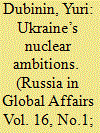

|
|
|
|
|
| Summary/Abstract |
he crisis of the nuclear nonproliferation regime, developing in the face of the growing threat of international terrorism and the desire of some countries to obtain the most deadly of weapons, motivates the international community to find new ways to counteract these developments. In the early 1990s, the author of this article participated in negotiations for the nuclear disarmament of Ukraine, a former Soviet republic which received its full independence in 1991. The ‘nuclear disarmament’ of Kiev, whose nuclear arsenals exceeded those of Britain, France and China combined, took more than two years of negotiations. The following details reminiscences about those negotiations. I hope our experience will be of use to those who must address similar problems with other countries, in a totally changed global situation.
|
|
|
|
|
|
|
|
|
|
|
|
|
|
|
|
| 12 |
ID:
161025
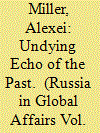

|
|
|
|
|
| Summary/Abstract |
The break-up of the Soviet Union took place amidst ranting about the slide of the last empire into history. It would seem perfectly clear some twenty years ago that the empire, as an outdated and backward form of political organization, was giving way to the nation-state. Explanations suggested that empires collapsed because of an inability to change, adjust themselves to modern requirements and withstand pressures from national liberation movements, which ostensibly embodied progress and justice.
|
|
|
|
|
|
|
|
|
|
|
|
|
|
|
|
| 13 |
ID:
161030


|
|
|
|
|
| Summary/Abstract |
Russia has pursued a multi-vector foreign policy since 2000, when Vladimir Putin began his first term as Russian president. Putin focused on establishing strong alliance—type relations with the United States and on further integration with the European Union as part of what was called Russia’s “European choice.” That short period was characterized by Putin’s support for the U.S. after the events of 11 September 2001 and was highlighted by Putin’s speech to the German parliament in October 2001.
|
|
|
|
|
|
|
|
|
|
|
|
|
|
|
|
| 14 |
ID:
161018


|
|
|
| 15 |
ID:
161020
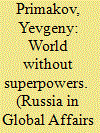

|
|
|
|
|
| Summary/Abstract |
Any discussion focusing on global stability and security would prove to be futile without first understanding the main global processes that have been taking place over the last few years. September 11, 2001, is popularly believed to be the watershed event in these processes. Indeed, the “mega terror” acts in New York and Washington made people take a new look at the world, at least from two vantage points.
|
|
|
|
|
|
|
|
|
|
|
|
|
|
|
|
| 16 |
ID:
161035


|
|
|
|
|
| Summary/Abstract |
The idea of writing this article came to me after a roundtable discussion of the prospects of U.S.-Russia relations hosted by the Rossiya Segodnya news agency in November 2015. I argued during the discussion that relations between the two countries had entered a period which is much more dangerous than the Cold War, including the Caribbean Crisis in 1962, and received critical responses (“We were on the brink of a nuclear war back then, but there is nothing like that now,” my opponents retorted). And yet, I believe that the risk of a military conflict between Russia and the United States in the next ten to fifteen years will be much higher than it was during their bipolar standoff.
|
|
|
|
|
|
|
|
|
|
|
|
|
|
|
|
| 17 |
ID:
161029


|
|
|
|
|
| Summary/Abstract |
Amajor task of global diplomacy is settling local war-related international crises. However, the post-Cold War period has witnessed the emergence of some new trends. Instead of taking a neutral stance whenever and wherever possible, and pushing warring parties towards peace, leading Western powers are beginning to act differently.
|
|
|
|
|
|
|
|
|
|
|
|
|
|
|
|